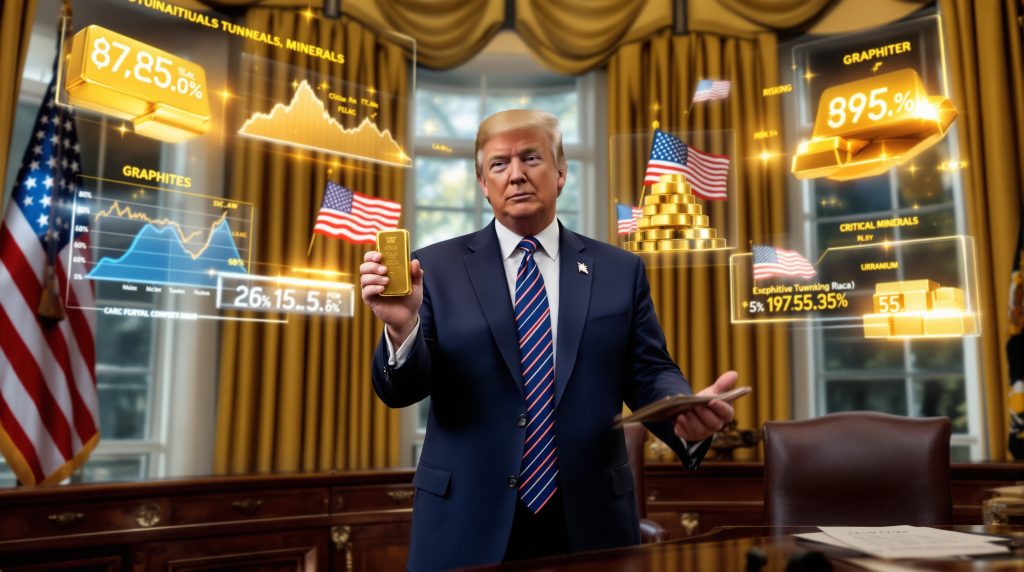Trump's Gold Bullion Exemption: What the Executive Order Means for Markets
In September 2025, President Donald Trump signed a notable executive order exempting gold bullion and several critical minerals from import tariffs. This decisive action reversed a controversial U.S. Customs and Border Protection ruling that had previously indicated gold bullion would be subject to import taxes, causing significant market confusion among traders.
Key Components of the Executive Order
The executive order specifically eliminates tariffs on gold bullion classified under multiple Harmonized Tariff Schedule codes. Beyond gold, it extends exemptions to strategic minerals including uranium, graphite, and tungsten. The order took immediate effect upon signing on September 8, 2025, and authorizes more flexible implementation of trade agreements with allied nations.
This targeted exemption represents a nuanced approach to trade policy, recognizing the unique position certain materials hold in both economic and national security contexts.
Why Did Trump Issue the Gold Exemption Order?
Market Stabilization Concerns
The executive order directly addressed market disruption that followed the Customs and Border Protection ruling on gold. When traders initially learned that gold bullion might be subject to import taxes, it created substantial uncertainty in precious metals markets and threatened to disrupt established trading patterns.
Gold markets experienced immediate volatility following the initial CBP ruling, with spot prices fluctuating as traders assessed potential impacts on international gold flows. The Trump executive order gold exemption aimed to quickly restore market stability before long-term damage occurred.
Strategic Resource Considerations
The exemption recognizes gold's unique position in the global financial system. Gold serves multiple critical functions:
- Functions as both a commodity and monetary asset
- Serves as a traditional safe-haven during economic uncertainty
- Maintains importance in central bank reserves worldwide
- Provides critical input for electronics and aerospace industries
Financial analysts noted that gold's dual nature as both commodity and quasi-currency makes it particularly sensitive to trade disruptions. Unlike typical commodities, gold frequently crosses borders as part of international financial operations and central bank activities.
Critical Minerals Security
Beyond gold, the order acknowledges America's dependence on imported strategic minerals:
- Uranium: Essential for nuclear energy and defense applications
- Tungsten: Critical for aerospace, electronics, and defense industries
- Graphite: Necessary component for battery technology and clean energy
The inclusion of these specific minerals reflects growing concerns about supply chain vulnerabilities exposed during recent global disruptions. Defense analysts have increasingly warned about America's reliance on potentially unreliable sources for these materials.
How Will the Exemption Impact Gold Markets?
Immediate Market Effects
The executive order produced several immediate effects on gold markets:
- Eliminated uncertainty that had temporarily disrupted normal trading
- Restored confidence among international bullion dealers
- Maintained established supply chains between major markets
- Prevented potential price distortions from tariff implementation
Market observers noted that trading volumes normalized within days of the announcement, with risk premiums quickly dissipating as participants absorbed the implications of the exemption.
Long-Term Trading Implications
Looking beyond immediate effects, the exemption is expected to:
- Support continued liquidity in U.S. gold markets
- Maintain New York's position as a global gold trading hub
- Preserve established relationships with major gold suppliers
- Avoid unnecessary complications in gold's role as a monetary asset
Financial sector analysts project that the exemption will strengthen New York's competitive position against other gold trading centers like London, Singapore, and Dubai, which might have gained advantage if U.S. import barriers had been implemented. Recent gold prices analysis suggests continued stability in the precious metals sector following this decision.
Which Other Metals Benefit from the Exemption?
Critical Minerals Included
The executive order extends beyond gold to include several minerals deemed strategically important:
| Mineral | Primary Applications | U.S. Import Dependence |
|---|---|---|
| Uranium | Nuclear energy, defense | High (>90%) |
| Tungsten | Aerospace, electronics | Very high (>95%) |
| Graphite | Batteries, clean energy | High (100% for high-purity) |
These materials share critical characteristics: they're essential for advanced technologies, face supply constraints, and come predominantly from a limited number of countries, creating potential vulnerabilities.
Strategic Importance of Included Minerals
These minerals share common characteristics that justified their inclusion:
- Limited or non-existent domestic production
- Essential inputs for advanced manufacturing
- Critical components for defense applications
- Significant to energy security and transition
Resource security experts highlight that these materials represent a strategic vulnerability that transcends typical trade considerations. For example, graphite quality and processing capability have become increasingly important as electric vehicle production accelerates, with China currently dominating the supply chain. The recent uranium market volatility has further highlighted the importance of securing stable supply chains for these materials.
How Does This Connect to Broader Trade Policy?
Trade Agreement Flexibility
The executive order contains provisions that extend beyond specific mineral exemptions:
- Authorizes the U.S. Trade Representative to implement tariff adjustments under existing trade agreements
- Enables more rapid execution of trade deals with allied nations
- Reduces bureaucratic hurdles for certain trade agreement modifications
- Creates pathways for bespoke arrangements with strategic partners
These flexibility mechanisms potentially signal a shift toward more differentiated trade relationships, moving away from one-size-fits-all approaches toward country-specific arrangements.
Balance Between Protectionism and Supply Security
The order reflects a nuanced approach to trade policy that attempts to:
- Maintain pressure on trading partners through selective tariffs
- Recognize the reality of supply chain dependencies for critical materials
- Protect domestic industries while ensuring access to essential inputs
- Address trade imbalances without disrupting strategic resource flows
Trade policy analysts note this represents a pragmatic recognition that complete self-sufficiency in certain materials is currently unrealistic, necessitating selective exceptions to broader protectionist approaches. The broader Trump tariff impact continues to reverberate through global markets even as these exemptions provide targeted relief.
What Do Industry Stakeholders Say About the Exemption?
Market Participant Reactions
The exemption has been generally well-received by industry participants:
- The London Bullion Market Association welcomed the clarity provided
- Mining companies expressed relief at the removal of potential barriers
- Metals traders appreciated the restoration of predictable market conditions
- Financial institutions noted the importance of maintaining gold's special status
Regulatory certainty appears to be the most valued aspect of the order, with market participants emphasizing that predictable rules matter more than the specific policy direction.
Critical Minerals Sector Response
Companies involved in critical minerals development have responded positively:
- Uranium producers highlighted the importance of maintaining nuclear fuel supply chains
- Graphite developers noted the alignment with clean energy objectives
- Tungsten suppliers emphasized the material's irreplaceable role in advanced manufacturing
Several mining executives pointed out that the exemption could potentially accelerate domestic exploration and development projects by ensuring market access for these materials regardless of their origin.
What Are the Economic Implications of the Gold Exemption?
Impact on U.S. Economy
The Trump executive order gold exemption is expected to have several economic effects:
- Maintains efficient operation of gold markets important to financial stability
- Ensures continued access to materials needed for high-tech manufacturing
- Supports industries dependent on these minerals for production
- Preserves jobs in sectors that rely on predictable access to these materials
Economic analysts estimate that disruptions to gold and critical mineral supply chains could have affected hundreds of thousands of jobs across manufacturing, technology, and financial sectors.
Global Market Considerations
From an international perspective, the exemption:
- Acknowledges the reality of global interdependence for certain critical resources
- Maintains established trading relationships for these specific commodities
- Recognizes the impracticality of domestic self-sufficiency for certain materials
- Distinguishes between strategic resources and other imported goods
International trade experts note that the selective nature of these exemptions sends an important signal about which supply chains the U.S. considers too strategically important to disrupt, even amid broader trade tensions.
How Does This Affect Investment Decisions?
Precious Metals Investment Landscape
For investors in precious metals, the exemption:
- Removes a potential complicating factor in gold investment decisions
- Maintains traditional pathways for physical gold ownership
- Preserves gold's status as an internationally mobile asset
- Supports continued market liquidity important to investors
Investment advisors note that regulatory certainty around gold's status helps maintain its appeal as a portfolio diversification tool, particularly as a hedge against inflation and currency risks. Current gold market trends suggest continued strong performance in this sector.
Mining Sector Investment Implications
For those investing in mining operations, the order:
- Provides clarity on market access for producers of exempted minerals
- Signals recognition of these materials' strategic importance
- Maintains established supply chains for critical mineral producers
- Potentially supports development of new sources of these materials
Mining sector analysts suggest the exemption could accelerate capital flows into exploration and development of these critical minerals by reducing regulatory uncertainty.
What's Next for Gold and Critical Minerals Policy?
Potential Future Developments
Looking ahead, several developments may follow this executive order:
- Further refinement of critical minerals lists and import policies
- Development of domestic production incentives for strategic materials
- Enhanced coordination with allies on critical mineral supply chains
- Continued evaluation of which materials warrant special trade status
Policy experts suggest that these exemptions may be just the first step in a more comprehensive approach to securing supply chains for materials deemed essential to national security and economic competitiveness. The administration's evolving critical minerals strategy is likely to build upon these exemptions.
Monitoring Implementation
Key aspects to watch as the exemption is implemented:
- Specific guidance from Customs and Border Protection
- Potential challenges or modifications to the executive order
- Market adaptation to the clarified regulatory environment
- Integration with broader strategic minerals policies
Regulatory specialists emphasize that the implementation details will ultimately determine the exemption's practical impact on markets and supply chains.
FAQ: Understanding the Gold Bullion Exemption
What specific gold products are exempt from tariffs?
The exemption applies to gold bullion classified under several Harmonized Tariff Schedule codes, specifically covering gold bars and similar forms of unrefined or semi-refined gold typically traded in wholesale markets.
Does this exemption apply to gold coins and jewelry?
No, the exemption specifically targets gold bullion rather than finished consumer products like coins, jewelry, or decorative items containing gold.
Why are these particular minerals considered "critical"?
These minerals are designated as critical due to their essential role in advanced technologies, limited domestic production capacity, and importance to national security and economic prosperity.
How does this order affect gold prices?
While the order itself doesn't directly change gold prices, it removes uncertainty that could have distorted markets and potentially adds a small degree of efficiency to gold trading by eliminating potential tariff costs.
Will this lead to increased imports of these minerals?
Rather than significantly increasing imports, the order primarily maintains existing trade flows that might have been disrupted by tariffs, ensuring continued access to these essential materials.
Further Exploration
Readers interested in learning more about U.S. trade policy regarding precious metals and critical minerals can also explore related educational content from Mining Weekly, which offers regular reporting on developments in global mining and metals markets.
Want to Profit from the Next Major Mineral Discovery?
Stay ahead of the market with Discovery Alert's proprietary Discovery IQ model, which delivers instant notifications on significant ASX mineral discoveries, turning complex data into actionable investment insights. Understand why historic discoveries can generate substantial returns by visiting Discovery Alert's dedicated discoveries page and begin your 30-day free trial today.




